|
|
|
Sort Order |
|
|
|
Items / Page
|
|
|
|
|
|
|
| Srl | Item |
| 1 |
ID:
192005
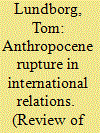

|
|
|
|
|
| Summary/Abstract |
The Anthropocene rupture refers to the beginning of our current geological epoch in which humans constitute a collective geological force that alters the trajectory of the Earth system. An increased engagement with this notion of a rupture has prompted a lively debate on the inherent anthropocentrism of International Relations (IR), and whether it is possible to transform it into something new that embraces diverse forms of existence, human as well as non-human. This article challenges that possibility. It shows how much of the current debate rests on the idea fulfilling future desirable ideals, which are pushed perpetually beyond a horizon of human thought, making them unreachable. As an alternative, the article turns to Jacques Derrida's understanding of the future to come (l'avenir), highlighting the significance of unpredictability and unexpected events. This understanding of the future shows how life within and of the international rests on encounters with the future as something radically other. On this basis, it is argued that responding to our current predicament should proceed not by seeking to fulfil future ideals but by encountering the future as incalculable and other, whose arrival represents an opportunity as much as a threat to established forms of international life.
|
|
|
|
|
|
|
|
|
|
|
|
|
|
|
|
| 2 |
ID:
114569
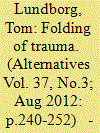

|
|
|
|
|
| Publication |
2012.
|
| Summary/Abstract |
This article examines the government of trauma by examining the rebuilding of Ground Zero as a practice of folding the traumatic event, of capturing the traumatic event by containing it within the forms of what can be said and what can be seen. Something always goes missing in this process: the ungraspable and inexpressible dimension of trauma, which ultimately resists capture. On this basis, it considers different architectural designs and proposals as expressions of different strategies of folding the traumatic event. One strategy seeks to capture and contain the traumatic event through the production of specific forms of seeing and speaking in the social field. A second strategy points to our inability to capture the traumatic event through folding. The conclusion considers how these two strategies can be used to analyze the political significance of architecture in the discourses of the war on terror.
|
|
|
|
|
|
|
|
|
|
|
|
|
|
|
|
| 3 |
ID:
139566
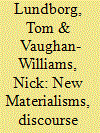

|
|
|
|
|
| Summary/Abstract |
This article investigates the recent ‘New Materialisms’ turn in social and political thought and asks what the potential theoretical and methodological significance might be for the study of International Relations (IR). To do so we return to debates about the theoretical status of discourse in IR as it is in this context that the question of materiality – particularly as it relates to language – has featured prominently in recent years. While the concept of discourse is increasingly narrow in IR, the ‘New Materialisms’ literature emphasises the political force of materiality beyond language and representation. However, a move to reprioritise the politics of materiality over that of language and representation is equally problematic since it perpetuates rather than challenges the notion of a prior distinction between language and materiality. In response, we draw on earlier poststructural thought in order to displace this dichotomy and articulate an extended understanding of what analysing ‘discourse’ might mean in the study of IR.
|
|
|
|
|
|
|
|
|
|
|
|
|
|
|
|
| 4 |
ID:
109462
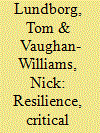

|
|
|
|
|
| Publication |
2011.
|
| Summary/Abstract |
This article investigates the political significance of the orientation of Western security relations around critical infrastructure (CI) and resilience planning. While the analysis is located in the International Political Sociology literature, it departs from recent biopolitical accounts of CIs and resilience. These accounts tend to present such apparatuses as closed, totalizing, and inevitably "successful" modes of governance. Rather, we argue that resilient CIs are open, vulnerable, and often absurd systems that continually falter, backfire, and often undermine themselves according to their own logic. By developing what we call a "molecular security" approach, we draw attention to the way in which life constantly evades capture. In this sense, we suggest, there is always an excess of "life" in biopolitics.
|
|
|
|
|
|
|
|
|
|
|
|
|
|
|
|
| 5 |
ID:
145974
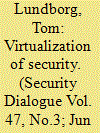

|
|
|
|
|
| Summary/Abstract |
During the last couple of decades, the virtual has emerged as a forceful conceptual tool in security studies. While used primarily in order to question assumptions about an objective truth concerning the meaning and value of security and different forms of insecurity, the implications of drawing on this concept vary considerably depending on how the virtual is conceptualized, and specifically how the potentiality of the virtual is linked to the process of actualization. Turning to the philosophies of Baudrillard, Agamben and Deleuze, as well as key thinkers in contemporary security studies, this article delineates three different approaches to analysing the virtualization of security. Focusing in particular on how these approaches point to contending views of ‘capture’ and ‘resistance’, it is argued that the choice of approach has serious implications for grasping what is at stake politically in the process of virtualization. These implications relate, more precisely, to how the virtual opens up and/or closes down the spaces of resistance that the modern subject of security traditionally has relied upon. In this way, the virtualization of security not only is important for thinking about capture and resistance, but challenges the very ground on which the modern subject of security rests.
|
|
|
|
|
|
|
|
|
|
|
|
|
|
|
|
|
|
|
|
|